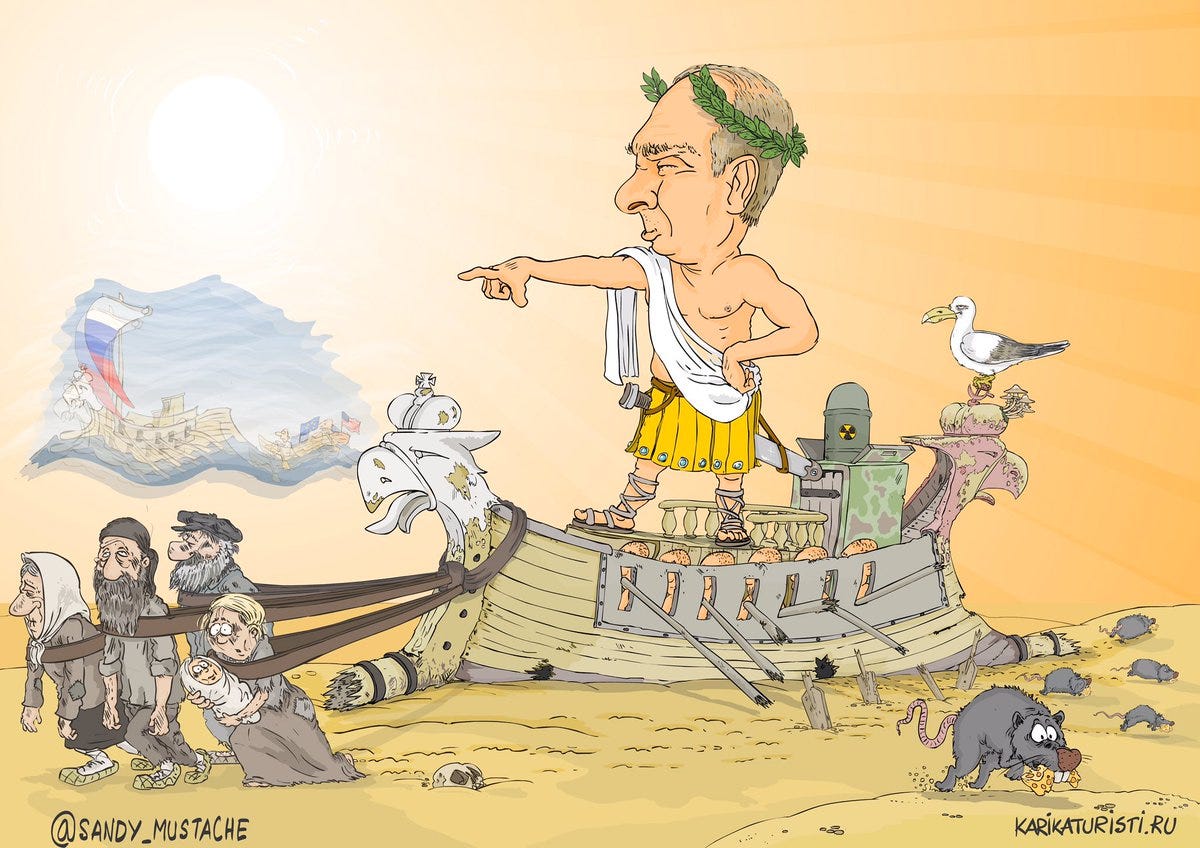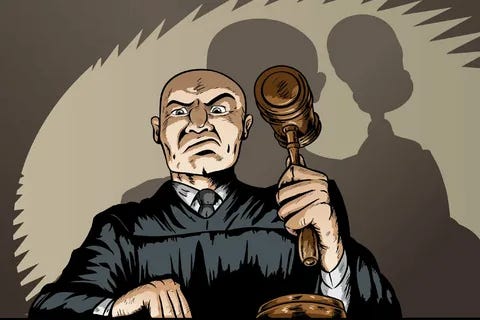May 23, 2022
Constitution? You’re kidding me!
The war could be very long
The planes as warehouses
Strange alliance
Believing in conspiracy
A country of total permissiveness
To avoid sanctions? Take a lesson!
Constitution? You’re kidding me!
Maksim Oreshkin, the Russian President’s economic aide, promised that Putin would decide on the parameters for indexing wages in the public sector and social payments this week. Although Putin once again said that “the Russian economy is withstanding the sanctions, withstanding quite decently [as evidenced by] ‘all the main macroeconomic indicators,’” the sharp spike in inflation forces the Kremlin to respond to the threat of falling living standards.
The government has two possible options on the table: Stingy and limited. According to the first one, the government can ignore the President’s promise on March 16 to increase salaries in the public sector1 and limit its indexation to 8.4%, which is budgeted for October 1. As of July 1, pensions are supposed to be indexed by 5% and social benefits by 9%. As a result, budget expenditures will increase insignificantly by 350 billion rubles (1.5% of the annual amount), making them almost invisible to the Finance Ministry. However, this scenario would lead to a sharp decline in living standards: According to VEB experts’ forecasts, real household incomes would decrease by more than 9%, with inflation at 19% in 2022.
A limited variant envisages the indexation of salaries in the public sector, pensions, and social benefits by 10% from July 1, 2022, for which the budget should allocate about 1 trillion rubles. However, this scenario also assumes that the real household incomes will decrease, although more slowly, only by 7.5%.
The level of indexation lags far behind the inflation rate in both options. Although the Russian Constitution, following Putin’s 2020 amendments, stipulates that pension indexation cannot be below the inflation rate, no one mentions this today.
The war could be very long
The war in Ukraine continues. The Russian army has concentrated maximum resources in the Donbas, seeking to complete the encirclement of the Ukrainian military near the towns of Sievierodonetsk and Lysychansk in the coming days. This rush is because the Ukrainian army is beginning to receive heavy weapons from Western countries, which could significantly change the balance of forces on the front.
The main success of the Russian army over the past two weeks was the capture of Popasna and further advancement 10-12 kilometers north and west. After that, the Ukrainian military was practically deprived of the possibility of using the railroad to supply its troops near Sievierodonetsk.
The second-most-important direction of the Russian offensive is toward Slovyansk-Kramatorsk from Liman-Yampil and Izium-Barvenkovo. Although the Russian army has had little success here, the constant threat is constraining the capabilities of the Ukrainian military.
The implementation of this plan will allow the Russian military to report to Vladimir Putin on the execution of their orders. Still, it is unlikely to change the overall picture: The likelihood of the war turning into a protracted military conflict, in which the opponents’ positions are becoming increasingly irreconcilable, is growing by the day.
Believing in a conspiracy
According to the recent VCIOM poll, more than one-third of Russians (37%) believe that secret and mighty forces are behind world events. This opinion applies mainly to citizens over 65 (49%) and those who actively watch television (48%).
Strange alliance
Kazakhstan is a crucial member of all the integration unions the Kremlin is trying to develop—the CIS, the CSTO, the EurAsEC—however, the authorities of this country are not going to help Russia cope with the sanctions pressure. Since the imposition of sanctions against Russian banks, 9.2 billion tenges ($21.6 million at current exchange rates) have been blocked on the accounts of their subsidiaries in Kazakhstan, said Madina Abylkassymova, chairman of the Agency for Regulation and Development of Financial Market of the Republic. Besides, foreign banks have blocked payments in foreign currency to some clients of Kazakhstan Sberbank in the amount of KZT2.9 bn. Payments and transfers in foreign currency to specific clients of Eco Center Bank (a subsidiary of the Russian Alfa Bank) were blocked in 3.9 billion tenges.
Despite the record harvest of wheat expected in Russia in 2022, the Russian authorities are trying to severely limit the export of grain, for which they require EurAsEC member countries to introduce quotas and duties on the export of grain. Kazakhstan opposes this idea, being a major grain producer interested in increasing its exports: With flour (recalculated in grain), the total volume of supplies reaches 7 million-8 million tons per season.
The basic principle of EurAsEC is the freedom of movement of goods within it. But as it often happens, “some animals are more equal than others.” If Kazakhstan does not agree to impose restrictions, Russia is ready to impose a complete ban on the sales of Russian grain to EurAsEC countries. This will not be a huge problem for Kazakhstan, but Armenia and Kyrgyzstan, importers of grain, will face tremendous difficulties.
As the Russian proverb says, friendship is friendship, but tobacco is roses.
The planes as warehouses
The Russian Ministry of Transport has joined the official information blockade and has ceased to publish data on airlines but has not blocked access to the data for analysts.
In April, the passenger traffic of Russian airlines decreased by 30% compared to 2021, amounting to 5.03 million people. In March, the year-on-year decrease in passenger traffic was 20%. However, it should be remembered that the number of passengers on international flights in 2021 was 75% below the level of 2019, the dock year. Consequently, a fair estimate would be a comparison with 2019—a drop of 45%.
An interesting comment was made by Pobeda Airlines, the discount division of the Aeroflot group, which had a 26% drop in passenger numbers in April: At the end of March, the company reduced the number of Boeing 737-800s from 41 to 25 to optimize “the needs for spare parts for the entire fleet.”
A country of total permissiveness
The Russian authorities continue to build up the weight of future problems that the Russian economy will deal with after the political regime change.
After the nationalization/theft of passenger planes and a ban on payments of dividends and coupons on bonds in favor of investors from “unfriendly countries,” the government is ready to release Russian companies from the obligation to pay royalties to companies that own intellectual property. According to the draft presidential decree, which will be signed in the coming days, license payments will have to be made in rubles to special accounts in Russian banks. Besides, the right holder will be able to withdraw money from the tabs only with the permission of the government commission.
Of course, the decree in the hierarchy of Russian law is much lower than the Civil Code, which declares the unconditional need to protect the rights of the right holder. But are you sure that Russian courts know this?
To avoid sanctions? Take a lesson!
Switzerland has lifted sanctions on EuroChem, which until recently was owned by Russian oligarch Andrey Melnichenko, who was put on the EU sanctions list in early March. However, on the day of the announcement, the company reported that Melnichenko had ceased to be its beneficiary, transferring assets to his wife, and had resigned from the Board of Directors. Because the initial EU sanctions were imposed on Melnichenko, not the company, EuroChem was able to demand that they be lifted after the change of beneficiary. The company took advantage of this opportunity. Thus, EuroChem became the first Russian company to have its sanctions eased after the change of ownership.
EuroChem Group is one of the largest fertilizer producers globally, producing nitrogen, phosphate, and potash fertilizers. In 2021, the company generated $10.2 billion in revenue, and sales of finished products totaled 27.2 million tons, 80% of which were exported.
[We] will soon take a decision to increase all social payments, including benefits and pensions, raise the minimum wage and the subsistence level, and increase salaries in the public sector. I ask the government to calculate the exact parameters of such an increase.






